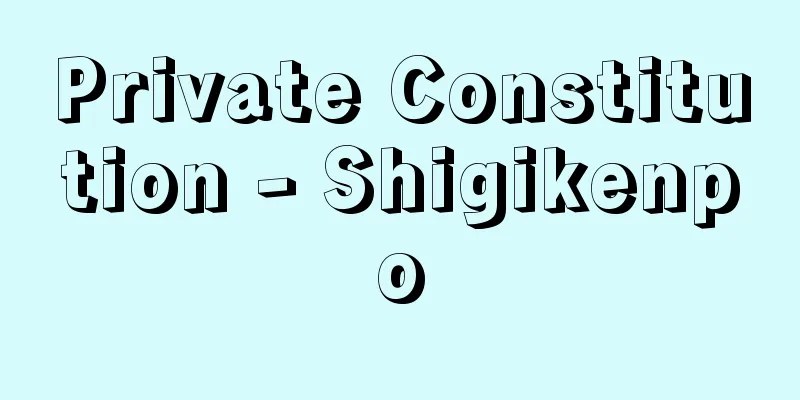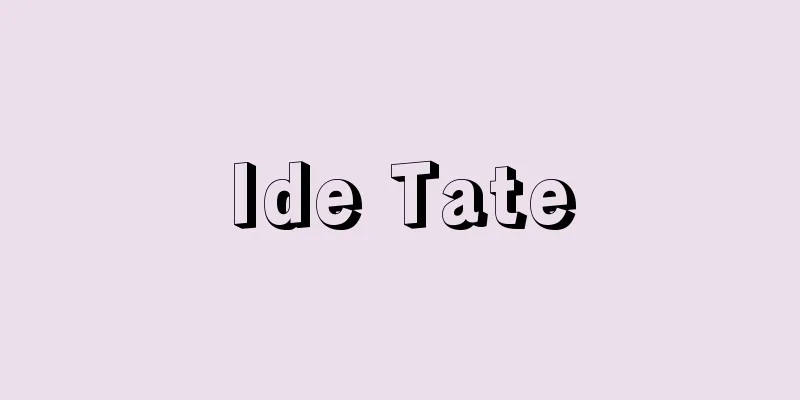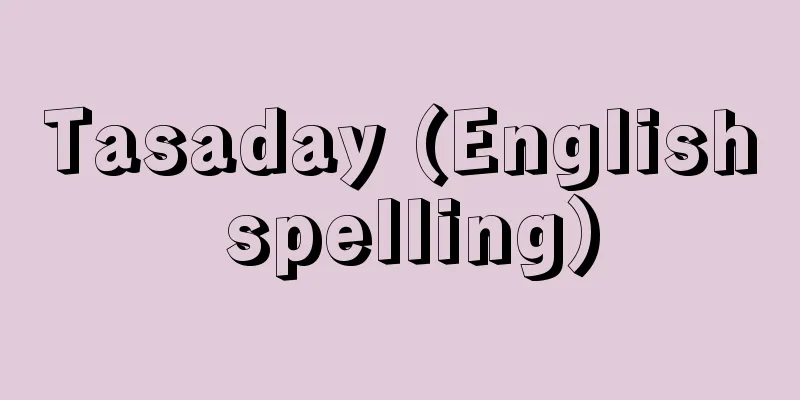|
Kojunsha "Private Draft Constitution" (excerpt)
Chapter I. Imperial PowerArticle 1. The Emperor shall govern the country through the Prime Minister and the two legislative chambers, the Senate and the Diet.Article 2. The Emperor is sacred and inviolable, and the Prime Minister is responsible for government affairs.Article 3. Revenues, expenditures, taxes, national bonds and other laws of the Japanese Government shall be passed by the Senate and the Diet, and shall only come into effect upon ratification by the Emperor.Article 4. The administrative power shall be vested in the Emperor, and administrative officials shall carry out all affairs in accordance with the law.Article 5. The judicial power shall be vested in the Emperor, and judges shall preside over all civil and criminal trials in accordance with the law.Article 6. The Emperor shall promulgate laws, command the army and navy, declare war and make peace with foreign powers, conclude treaties, grant offices and titles, reward meritorious service, mint currency, pardon crimes, and have the special power to open and close the Senate and the National Assembly, appoint Senators, and dissolve the National Assembly. However, treaties for the renewal of maritime taxes shall be kept in reserve and submitted to the Senate and the National Assembly for deliberation. Article 7. The Emperor shall appoint a Cabinet Prime Minister, and shall have confidence in all government affairs. Chapter II. Cabinet Article 8. The Cabinet shall be composed of the Ministers of each Ministry and Cabinet Advisors. Article 9. The Cabinet Ministers shall work together in harmony to carry out domestic and foreign government affairs, and shall be responsible for them jointly. However, this does not apply to matters that are the responsibility of one Minister and do not concern the other Ministers.Article 10. There shall be one Prime Minister in the Cabinet, who shall sign his name and promulgate all laws and Cabinet Orders that have passed the Supreme Court.Article 11. When the Cabinet has not yet made a decision, the Prime Minister may make the decision and refer it to the Supreme Court.Article 12. The Prime Minister shall be personally selected by the Emperor in accordance with the will of the people, and other Prime Ministers shall be appointed upon the recommendation of the Prime Minister.Article 13. Cabinet Ministers shall be limited to members of the Elder Council or, at the very least, members of the Diet.Article 14. The Cabinet shall necessarily draft bills for the Government's budgetary revenues.Article 15. Any bill originating from the Cabinet shall first be submitted to the Diet for discussion, and after a resolution has been passed, that House shall transmit the bill to the Senate for discussion.Article 16. The Cabinet shall report annually to the Senate and the Diet on the previous year's expenditure and expenditure accounts and the outline of the business it has carried out, and shall report from time to time to both Houses on important domestic and foreign affairs situations.Article 17. Should the opinions of the Cabinet not be in agreement with the opinions of both Houses of Parliament, the Cabinet Prime Minister shall either resign from his position or use the Emperor's special prerogative to dissolve the Diet.
"Constitution of the Empire of Japan" (Excerpt from the Itsukaichi Constitution Draft)
Part III Legislative Power Chapter I Popularly Elected Houses (78) A popularly elected House shall consist of representatives elected by direct ballot in accordance with the rules established by the Election Law, with one member for every 200,000 inhabitants (79). The term of office of the representatives shall be three years, and half of them may be renewed every two years, but the term of office may not be repeated several times (80). Any Japanese national who is a lay citizen (not a priest, monk, teacher, or missionary) and enjoys political or civil rights, is a male over 30 years of age, owns a certain amount of property, proves that he has income from private property, and pays a direct tax in the amount set out in the Election Law, and does not hold any regular literary or military position, may be elected to a senate in accordance with the Election Law. (81) In all cases, Japanese nationals who meet the conditions and requirements set out herein may be elected to a senate only within their own district, and the other half may be elected to any district of any prefecture. However, they may not hold the position of senator in the senate. (82) Representatives (not local representatives elected by the people) are representatives of the entire Japanese people and are therefore not subject to the orders of the electors. (83) Minors and women prohibited from childbirth, idiots and insane persons, homeless slaves, recipients of government subsidies, persons sentenced to one year or more in prison for a common crime, and missing persons who have been reported, may not be elected representatives. (84) A popularly elected House has the special power to draft measures relating to the finances (tax and national bonds) of the Japanese Empire. (85) A popularly elected House has the power to inspect the current administration and to rectify any problems in the administration. (86) A popularly elected House has the power to debate motions issued by the executive and to tamper with motions made by the Emperor. (87) A popularly elected House has the power to summon officials and the people to urgent investigations. (88) A popularly elected House has the special power to summon and denounce to the Senate any official (consul or councillor) whom it finds to have committed a political offence. (89) A popularly elected House has the power to decide on the following matters in relation to the personal affairs of its members: 1. Those who violate the rules and regulations of the popularly elected House or the special powers of the House. 2. Actions relating to the selection of members. (90) A popularly elected House may select its president and vice-president from among its members and ask for the Emperor's approval. Since the original text does not have article numbers, I have included serial numbers in parentheses.
Ueki Shimori "The Constitution of Japan" (excerpt)
Article 40. Those who are part of the Japanese political society shall be Japanese people. Article 41. The Japanese people may not renounce their Japanese citizenship if they choose to do so of their own accord, or shall not cease to be Japanese unless they consent to it. Article 42. The Japanese people are equal under the law. Article 43. The Japanese people shall not have their freedom rights violated outside the law. Article 44. The Japanese people have the right to maintain their life, limbs, body, health, dignity, and the use of all property on earth. Article 45. The Japanese people shall not be deprived of their life, regardless of the crime committed. Article 46. The Japanese people shall not be subjected to any punishment apart from the law, nor shall they be arrested, detained, imprisoned or interrogated apart from the law. Article 47. The Japanese people shall not be subjected to any punishment of bodily indignity for a crime. Article 48. The Japanese people shall not be subjected to torture. Article 49. The Japanese people shall have freedom of thought. Article 50. The Japanese people shall be free to believe in any religion. Article 51. The Japanese people shall have the right to freedom of speech. Article 52. The Japanese people shall have the right to freedom of debate. Article 53. The Japanese people shall have the right to write and publish their language and make it public to the world. Article 54. Article 55. The Japanese people have the right to assemble freely. Article 56. The Japanese people have the right to walk freely. Article 57. The Japanese people have the right not to have their residence invaded. Article 58. The Japanese people are free to reside wherever they want and to travel wherever they want. Article 59. The Japanese people are free to have no teaching or to study any subject. Article 60. The Japanese people are free to operate any industry. Article 61. The Japanese people may not have their houses searched or their belongings opened without due process of law. Article 62. The Japanese people may not violate the secrecy of their correspondence. Article 63. The Japanese people are free to leave Japan. Article 64. The Japanese people may not resist any lawless acts. Article 65. Article 66: The Japanese people shall not have their private property confiscated, even if they have committed a crime. Article 67: The Japanese people shall not use property for public use without due compensation. Article 68: The Japanese people shall have the right to petition the government in their own name. They shall have the right to petition for themselves, and in the case of public corporations, they shall submit petitions in the name of the corporation. Article 69: The Japanese people shall have the right to entrust their affairs to the government. Article 70: If the government violates the Constitution, the Japanese people shall have the right to refuse to obey it. Article 71: If the government oppresses government officials, the Japanese people shall have the right to reject them. The "Meiji Bunka Zenshu" version lacks this second paragraph.)
Article 72: When the government uses its power to commit arbitrary violence and rebellion, the Japanese people have the right to resist it with weapons. Article 72: When the government arbitrarily violates the Constitution, arbitrarily impairs the people's freedom and hinders the purpose of the founding of the nation, the Japanese people have the right to destroy it and establish a new government. Article 73: The Japanese people have the right to refuse accommodation to soldiers. Article 74: When the Japanese people are summoned to court for questioning, they have the right to hear the reasons for the charges, to contest those who are accusing them, and to obtain witnesses to assist them and people who will make a confession. (From the revised edition of "Constitutional Ideas in the Early Meiji Period" edited by Ienaga Saburo et al.) [Reference] | Private Constitution Private Constitution (1) A draft constitution that was drafted by a private citizen in the early Meiji period in pursuit of the establishment of a constitutional system. The term "privately drafted constitution" refers to an individual privately working out the constitution. There are those drafted by government officials to serve as a reference for the authorities, and those drafted by private individuals or groups. Generally, however, the term "privately drafted constitution" refers to those drafted by civil rights groups to appeal to their comrades and the people about their vision for the nation during the Freedom and People's Rights Movement, which demanded the establishment of a constitutional system. Within the government, in addition to the one drafted by Aoki Shuzo at the request of Kido Takayoshi in 1873 (Meiji 6), there are also drafts by Nishi Amane, Inoue Kowashi, Yamada Akiyoshi, and others. Many of the privately drafted constitutions were drafted by civil rights groups during the height of the civil rights movement from 1879 to 1881. The Kaishinto Party's related works include the Oumeisha proposal, Kyozon Doshu's "Private Proposed Constitutional Opinion," and Kojunsha's "Private Proposed Constitutional Draft," all of which adopted a parliamentary cabinet system based on the British-style constitutional monarchy. The "Constitution of the Empire of Japan" (Itsukaichi Constitutional Draft), which inherited the Oumeisha proposal and was drafted by a group of rural youth from Itsukaichi including Chiba Takusaburo, took careful consideration of human rights protection. The Liberal Party's related works include the Risshisha's "Prospective Proposal for the Japanese Constitution" and Ueki Emori's "An Annotation of the Japanese National Constitution," which acknowledge the existence of a monarch, but take a popular sovereignty stance and present distinctive ideas such as detailed provisions for the protection of human rights, local autonomy, a unicameral system (giving strong powers to the parliament), and provisions for the right of resistance. Ueki's proposal in particular is unique in that it adopts a federal system and recognizes the right to revolution. Furthermore, the "Opinion on the National Constitution" of the Tokyo Nichi Nichi Shimbun (Fukuchi Genichiro), known as a pro-official newspaper, puts forward a mystical view of the emperor as the subject of authority, but also shows constitutionalist aspects such as the rule of the emperor and the people together and a responsible cabinet system. The proposals of the civil rights faction take the position of a national contract or a constitution under a civil contract in opposition to the government's idea of an imperial constitution, and the "Opinion on the National Constitution" also supports the idea of a constitution under a national contract. Currently, over 40 types of privately drafted constitutions have been identified. (2) After the collapse of the Empire of Japan following defeat in the Second World War, and in the process of discussing the construction of a new Japan, private citizens drafted a constitution to replace the Constitution of the Empire of Japan. Over a dozen draft constitutions have been identified, including those by political parties. Representative examples include the "Outline of a Draft Constitution" (December 1945) by the Constitution Research Association, led by Takano Iwasaburo and Suzuki Yasuzo; the "Outline of a Private Draft of a Revised Constitution" (same date) by Takano Iwasaburo; and the "Draft Constitution of Japan" (January 1946) by the Constitution Discussion Group, led by Inada Masatsugu and Unno Shinkichi. Of these, the "Outline of a Draft Constitution" was based on Ueki's draft from the Freedom and People's Rights period, and influenced the GHQ draft that became the basis of the Constitution of Japan. [Shozo Matsunaga] "The History of the Establishment of the Meiji Constitution, Volumes 1 and 2, by Masatsugu Inada (1960, 1962, Yuhikaku) " "The Constitutional Ideas of the Early Meiji Period, eds. Saburo Ienaga, Shozo Matsunaga, and Eiichi Emura (1967, Fukumura Publishing) " "Documents of the 20 Years of Postwar History, Volume 3: Law, eds. Hiroshi Suekawa (1966, Nippon Hyoronsha)" [References] | Itsukaichi Constitution Draft | Constitution of Japan [Supplementary Material] | Private Draft Constitution Source: Shogakukan Encyclopedia Nipponica About Encyclopedia Nipponica Information | Legend |





![Osarizawa [town] - Osarizawa](/upload/images/67cfcf948b3d7.webp)




